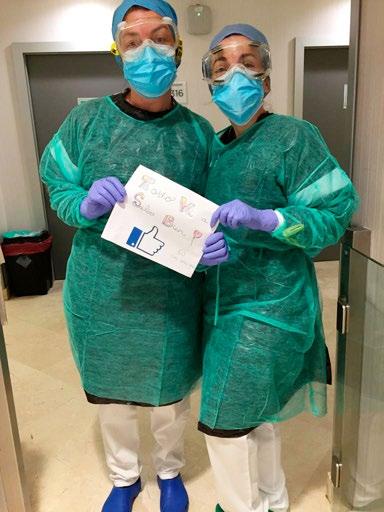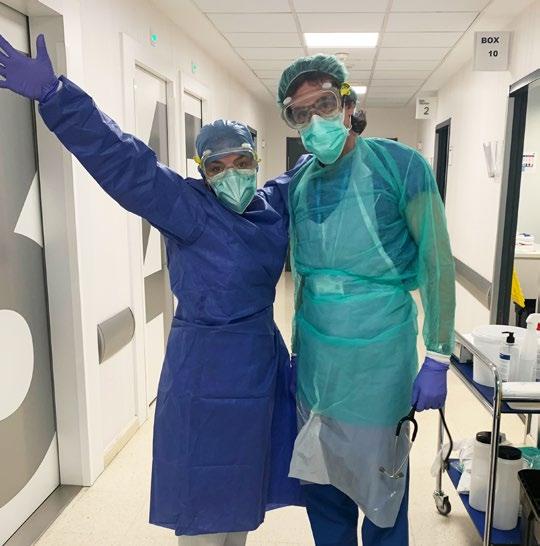
6 minute read
I was lucky to be a nurse
laura alvargonzalez Director of Nursing Hospital Sanitas La Moraleja
The nursing supervisors and I need to be seen to be strong, the ones with the answers, even when we are just as worried as everyone else. The attitude and dedication of the staff is indescribable. I can’t begin to express how proud I have been of our staff, how they have surprised me time and time again in a positive way, and the knowledge we have built up between us in this crisis. Covid hit our hospital suddenly with our first case, on a Friday. The next week we had reached 50 cases and it carried on like that for the first weeks. On 11 March a state of emergency was declared in Spain and on 18 March the hospital was full, all of them Covid patients. We were forced to cancel every other scheduled appointment, except emergencies. We had to create new circuits and procedures, making almost a whole new organisation. We opened extra units and had to double the number of beds in the hospital and in intensive care unit and also reinforce our emergency department. Madrid was one of Spain’s worst-affected areas. There weren’t enough staff – they had all been called up by the public health service. We had more and more patients to treat, and management were asking more and more of us. Sometimes I would get cross with my boss, as if the pandemic was his fault. We had to change. We were used to having one patient per room and we had to double them up. It wasn’t just the extra workload, it was the psychological burden.
MADRID — SPAIN
We would get to work at seven in the morning and go home at midnight or 1 a.m. the next day. We worked like that for six weeks, without one single day off, because we couldn’t stay at home. We weren’t the only ones – nearly all the staff had that attitude, with very few exceptions. They worked double shifts, which was physically and mentally exhausting, and didn’t complain. It wasn’t the work itself that was too much for us, but the helplessness we felt as everything was out of our hands, out of our control and beyond our knowledge. We have evolved since then in our knowledge of Covid and as a result we work differently now. At the beginning, we were applying treatments that didn’t work with poor results. Little by little, we started to change our procedures, to understand what we were fighting, and this was a great boost for our morale. One of our successes was the recovery of Juan Antonio, a 53 year old man, our first patient in the new ICU, which was actually the operating room, converted for the purpose. That happened on 29 March. His recovery was an injection of strength for us all. It was also a great and well-deserved reward for the professionals who experienced it. It was the operating room nurses who managed to save a great guy. They were amazing! I am so lucky to work for this company! We had so many people supporting us. All you had to do was pick up the phone and say: I need masks, more beds, people to look after the children, and our people would come to work willingly, even renting hotel rooms so they didn’t infect their families. Another key thing was that Sanitas has been working with video appointments for a long time. Our director has insisted on the implementation of digital technology. To be honest, health professionals are very reluctant in some ways, because we like to be able to see and touch things, and because of that, it took over a year to introduce the digital platforms. Then suddenly, Covid forced us to do in one week what would have taken us ten years. Perhaps we will never fully appreciate how far we have come and how much it has meant to be able to hold remote consultations. We must not forget that our non-Covid patients needed and deserved our attention. In the first weeks the world shut down and patients came in alone, without anyone accompanying them, because we couldn’t control what they touched or whether they were well-protected, and we had to be careful not to spread the disease.


We had to abandon our customary personal touch with patients. Where we knew the person wasn’t going to recover and was going to die soon, we would call the family in to say goodbye, but it was all very cold. We only let them have twenty minutes, and didn’t let them get too close. But we tried to make up for that with the miracle of technology. We used everything constantly: phones and tablets that the company provided. A lot of farewells were said that way and you felt like you were invading what ought to have been a very private time. I remember the good moments, of which there were many. We watched lots of patients recover, people who went out stronger and who helped us keep going ourselves. My family were hugely supportive. I am married, with three children aged 17, 15 and 13 years old. My husband is asthmatic and I was really afraid of passing it to him. I can’t thank him enough for how easy he made it all for me. The first weeks, he worked from home, which helped me be able to be very flexible, and he didn’t let me lift a finger at home. I would open my front door and go straight to my room. The next day, I would have a shower and go back. That was my family relationships for the first two or three weeks – non-existent, basically. My husband would say: Forget the house - I will deal with that, you deal with the hospital. That helped me to be with my team, who were very overworked. I tried to lighten their load and doing analyses and dealing with the deceased so that they didn’t have to deal with the corpse of someone they had got close to. We were more afraid of the future than the present. There were times when we couldn’t see any light at the end of the tunnel, but after four weeks of lockdown in Spain we started to see a small shaft of light. Where there had been 100 Covid patients waiting to be admitted, it was down to twenty. I think Covid gave me back the chance to be on the front line with my patients. Before that, I sometimes wondered why I had studied nursing if I was going to end up in administration. I should have studied business administration, as all I did was project planning, human relations, but no nursing. But after all we have been through I can only say: How lucky I am to have studied nursing! The most difficult part is behind us and is actually the most gratifying part of my ten years as nursing director. It is really special when your staff tell you that they have felt supported and that they knew they were not alone in the crisis. �








